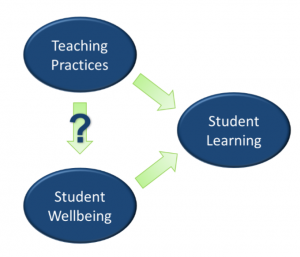
(Photo credit: Andy Roberts, Flickr link here)
“If the frogs in a pond started behaving strangely, our first reaction would not be to punish them or even to treat them. Instinctively, we’d wonder what was going on in the pond.”
Sharing the same sentiment expressed in this quote by Dan Reist, our team at the University of British Columbia wonders how the post-secondary environment and teaching practices may affect the mental health and wellbeing of undergraduate students. Numerous studies have shown that both sound mental health and teaching practice contributes to student learning, but little is known about how different teaching practices impact student mental health and wellbeing.

The rising number of students experiencing mental health challenges prompts us to explore how different teaching approaches may improve student mental health and wellbeing. To this end, with the support of the Teaching and Learning Enhancement Fund, we spearheaded the Teaching Practice & Student Mental Wellbeing project at the University of British Columbia, where we engaged students, faculty, instructors, and staff alike to participate in our quest to identify and eventually promote teaching practices that are conducive to improving student mental health and wellbeing.
Our team conducted a mixed methods study over the 2015/16 academic year, consisting of two campus-wide surveys, 7 focus groups (with a total of 29 students), and 16 instructor interviews. This blog is a platform to share our findings on teaching practices that promote both student learning and student wellbeing, and is a place where we can discuss and share wellbeing-promoting teaching practices with each other.